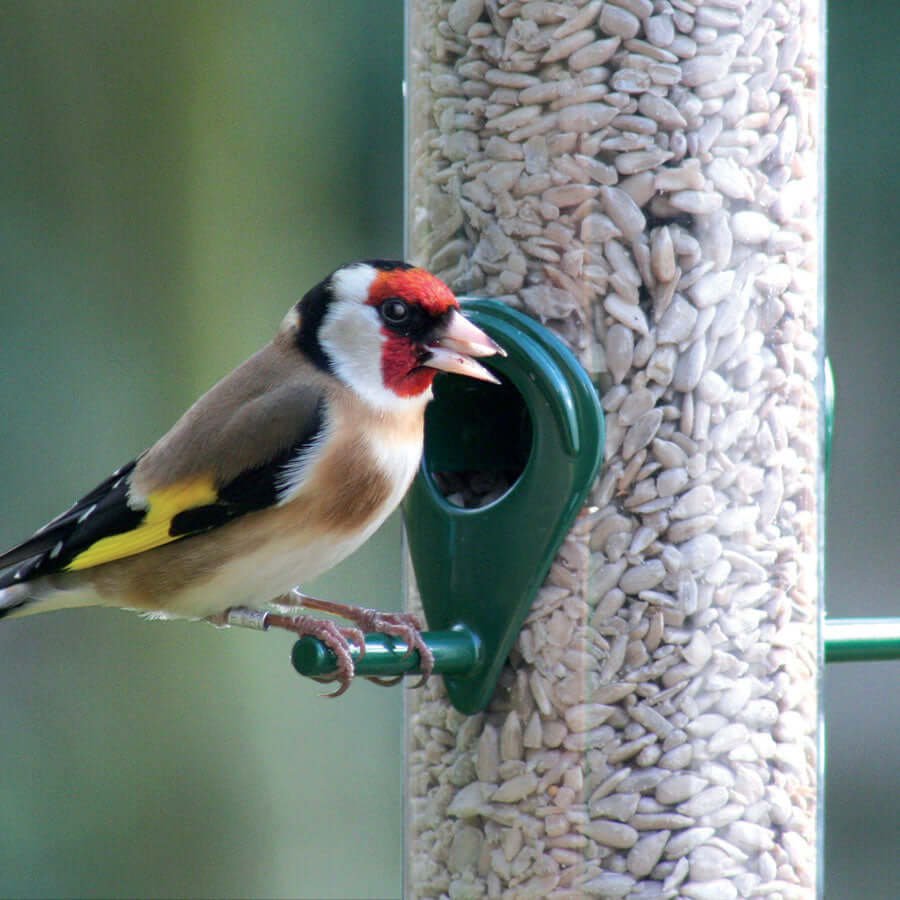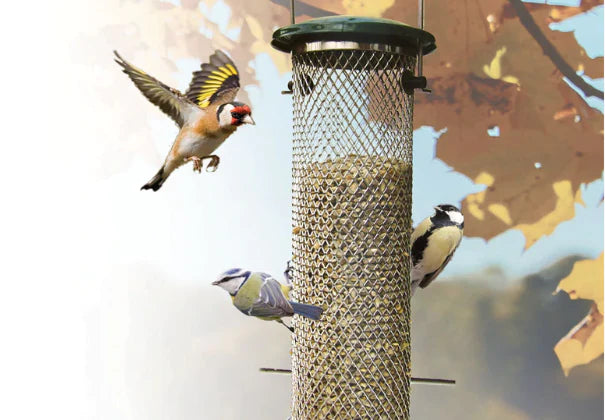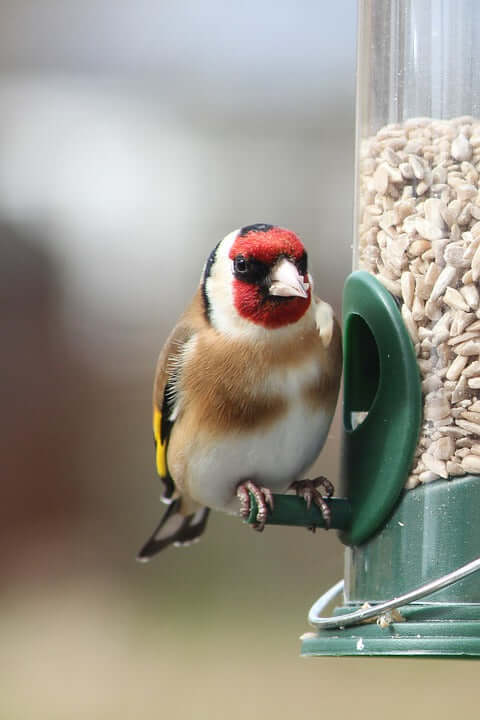HAITH'S to HOME
Sunflower Hearts - Premium Quality
Sunflower Hearts - Premium Quality
Ideal for
Ideal for
Blackbird, Song Thrush, Robin, Wren, Dunnock, Great Tit, Blue Tit, Coal Tit, Long-Tailed Tit, Goldfinch, Greenfinch, Chaffinch, Siskin, Starling, House Sparrow, Collared Dove, Great Spotted Woodpecker
Couldn't load pickup availability
Sunflower Hearts for birds can attract a wide variety of species.
Super-high-energy, premium-quality Sunflower Hearts are simply sensational! Easy to feed and SuperClean™ at competitive prices.
Sunflower Hearts are plump, clean and safe for garden birds.
Haith's hearts also provide high calorific value and high energy to keep garden birds healthy. They're universally well-known for keeping bird feeding simple yet effective. The number of birds they appeal to is sensational, which is why they feature in many of our high-energy bird seeds.
Feeding de-husked sunflowers helps birds spend less time cracking open Black Sunflower Seed husks and more time providing for their family during the breeding season.
Hearts appeal to so many garden birds – no wonder they’ve overtaken peanuts as the number one garden bird food of choice. They’re worshipped by Goldfinches who, in some gardens, in parts of the UK, prefer them to Niger Seed - perhaps because they're bursting with high energy and nutrition.
They feature in many of our high-energy garden bird foods.
Feed sunflowers from tube-type seed feeders, bird tables, ground feeders or sprinkle them on the ground.
Please Note: Our products are manufactured in a facility that handles nuts and may contain traces of nuts.
Share









I was very happy with my order. It arrived quickly and everything was top notch!
the delivery was excellent!
WOULD DEFINITELY RECOMMEND THEM.
the birds love the sunflower hearts.
[****]
Great quality , birds love
Hello, thank you for your kind words! We are so glad your garden birds are enjoying our Sunflower Hearts.
Attracted to our sunflower hearts are lots of goldfinches, robins, blue tits, greenfinches, occasional woodpecker.
Hello Mark, thank you for your lovely review! It's great to hear that our sunflower hearts are attracting a variety of beautiful birds to your garden.
they really like the Sunflower hearts which are in squirrel proof feeder
Hello Margaret, thank you for your lovely review! We're happy to hear that the birds are enjoying our Premium Quality Sunflower Hearts in our squirrel proof feeder. We appreciate your support and hope to continue providing quality products for you and your garden birds.
Over the last five years the goldfinch population has steadily increased and they love the sunflower hearts. We also see small songbirds, blackbirds and starlings.aaaaa
Hello Helen, thank you for your review! It's great to hear that our sunflower hearts are a hit with the goldfinches and other small songbirds in your area. We're happy to be contributing to the increase in their population.
What are the benefits of feeding sunflower hearts?
Sunflower Hearts boast high oil content, making them a valuable energy source for birds throughout the year and they are especially beneficial during the chilly autumn and winter seasons and during the breeding season. Sunflower hearts exhibit remarkable versatility and can be fed in various ways, such as from bird seed feeders, atop bird tables, or even scattered directly on the ground.

What type of bird feeder is best for sunflower hearts?
We particularly adore this Sunflower Hearts Feeder because it combines aesthetic appeal with exceptional functionality. This mid-range bird feeder is crafted entirely from metal, making it a durable choice. Furthermore, it comes equipped with a removable base, which simplifies the cleaning process.

Which birds eat sunflower hearts?
Sunflower hearts are a nutritious option for wild birds such as Blackbird, Song Thrush, Robin, Wren, Dunnock, Great Tit, Blue Tit, Coal Tit, Long-Tailed Tit, Greenfinch, Chaffinch, Siskin, Starling, House Sparrow, Collared Dove and Great Spotted Woodpecker. Remarkably, in certain garden settings, Goldfinches have shown a preference for them over Niger seeds and in some gardens charms of Goldfinch can be seen feeding regularly on sunflower
hearts.
Facts about sunflower hearts:
-
High energy source
Sunflower hearts are the kernel of the sunflower seed, with the hull removed. They are packed with energy, providing birds with essential fats that help them maintain their energy levels.
-
Nutritional Content
They are rich in essential oils, protein and vitamins, making them a highly nutritious food source for birds.
-
Easy to Digest
Since the tough outer shell is removed, sunflower hearts are easier for birds to eat and digest. This means birds can quickly grab a bite without expending too much energy on cracking open seeds.
-
Less Mess
With the hulls removed, there's less debris and waste left behind in feeders, making them a cleaner feeding option.
-
Reduced Risk of Disease
The absence of hulls means there's a reduced risk of mould growth in feeders, leading to a healthier feeding environment for birds.
-
Cost-Effective
While sunflower hearts might be more expensive than whole sunflower seeds, they are often more cost-effective in the long run because there's no waste.
-
Supports Bird Health
The high-fat content in sunflower hearts helps birds develop a thick layer of insulation (fat) during the colder months, essential for keeping them warm.
-
Natural Food Source
While they're popular in bird feeders, sunflowers also naturally attract birds when grown in gardens or wild areas.
Sunflower Hearts FAQs
What is the shelf life for sunflower hearts?
The shelf life for our sunflower hearts is 6-8 months, ensure to keep stored in a cool dry place.
When should I feed sunflower hearts?
Ideal for year-round feeding, Sunflower Hearts offers a high energy content that is well-suited for both the colder winter months and the breeding season. This nutritious choice supports fledglings in their quest for food and provides essential energy for various activities during this time.
Are Sunflower hearts messy to feed?
No. Sunflower Hearts are 100% edible and leave no mess because their husks/shells have been removed.
What's the difference between sunflower seeds and sunflower hearts?
Sunflower seeds (such as black sunflowers) have a husk – which gathers as waste material beneath bird feeders, which requires cleaning and sweeping away; however, sunflower hearts have had their husk removed so they generate no mess and no waste.











